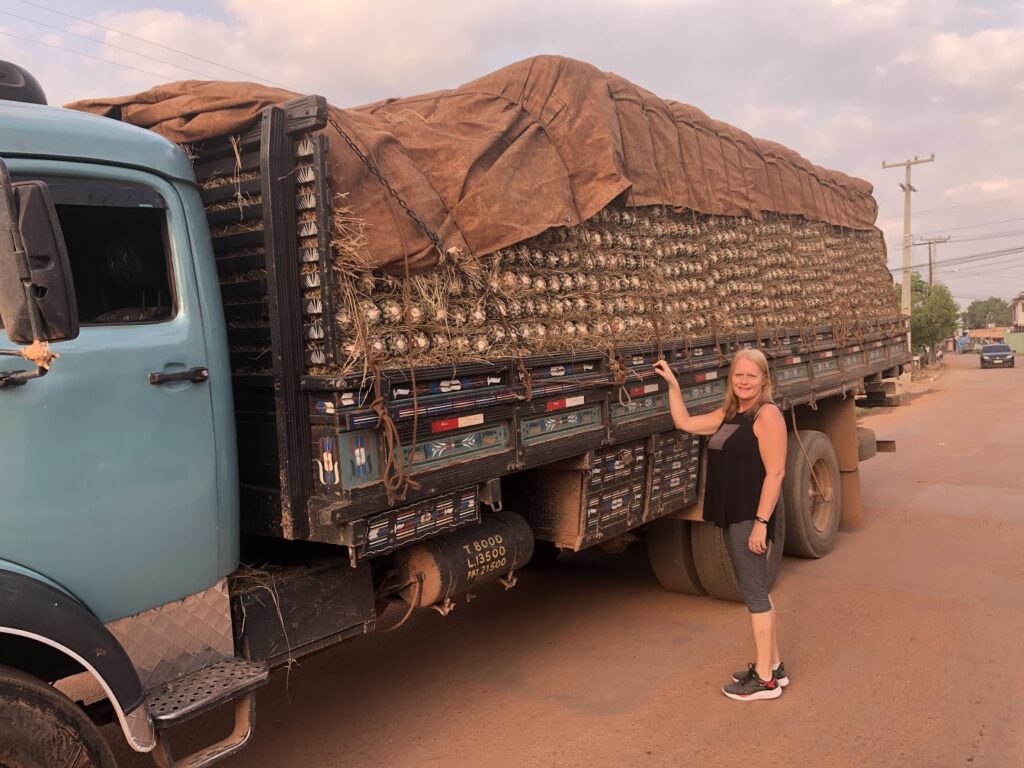 |
| I wrote this in the barbecue area at a friend’s house in Santarem. |
 |
| I wrote this in the barbecue area at a friend’s house in Santarem. |
Now when I pray I often tell our Heavenly Father, “I want you to be Present. Being a good provider is important but I want a Father who is present all the time, and who will train me how to do stuff.”
Jesus says “This is the kind of prayer our Father loves to answer.”
“If you then, though you are evil, know how to give good gifts to your children, how much more will your Father in heaven give the Holy Spirit to those who ask him!” (Luke 11:13).

I am the oldest, Henry is two years younger, and Marlene is seven years younger than me.
When Columbia Bitulithic had a paving plant that was losing money they would send Dad in to get it profitable again. He would get up at 2:00 a.m. to start the burners so the tar would be sufficiently warm at 6:00 when the trucks arrived. He went to bed early and mom had to keep us kids quiet as we lived in small hotel rooms all summer long. The company paid for Dad’s meals at the cafe, and since we were a family of five they allowed us to have supper at the restaurant every second night. We could get whatever kind of pop we wanted. This was very special. All the other meals mom cooked as the hotel room had a kitchenette. The smell of hot asphalt still floods me with good memories. Mom was the best possible mom through those years and of course we couldn’t live year-round on the road crews but as a young child I hated the months when dad was up North and we had to go back to the Fraser Valley. Maybe this is partly why I quit high school at 17 to go North to find work.

My dad is the second from the left, the middle of the dark coveralls.
I thank God for various mentors over the years, but mostly I thank Him for His commitment to be present, to carry me when things get too rough, and to help me walk out my destiny.
Eulevan was a dedicated bodyguard and specialist of Saint Benedito. Fatima belonged to a special group of women who were dedicated to worshiping this patron saint of Gurupá. Heitor, their 16-year-old son, prayed for his parents and sister for years. After Fatima became a Christian, she grew tired of her 30-year-old common law relationship with Eulevan. She came to Pastor Edna for counsel. After her Immanuel Prayer experience with Jesus Fatima “gave up on giving up on their marriage” and she started to pray. This year, 2020, Eulevan came to Jesus and they got married in November.


Eulevan and Fatima got married this year, and transferred their allegiance from St Benedito to Jesus.

Heitor, far left, is hungry ready to do God’s will, as are a growing number of young people in this region.

Edna and Leão are pastors in Gurupá, and at the November 2020 training event they were ordained as regional supervisors for the Xingu and Marajó Regions. It is a huge area, a God-sized challenge to evangelize well.
(Bowen, M., 1993, p. 499)
Bowen, M., 1993, Family Therapy in Clinical Practice. Jason Aronson, Inc. Kindle Edition.
Gilbert, R., 2018, The Eight Concepts of Bowen Theory, Leading Systems Press. Kindle Edition.
There was only one other couple in the café. We got our coffees and sat down at a different table. The early morning coffee tasted even better because it was snowing outside. The businessman I was meeting was burdened. Memories of many coffees like this decades ago helped the stories to flow. My friend started explaining his concerns and convictions. I was soaking in the Northern air, sipping my coffee, and listening to my friend’s interpretation of the news. Suddenly the other table in the room exploded. The chairs scraped back, almost falling over. The beautiful lady jumped up and came over, madder than a hornet. All I really heard were the loud f-words and that my friend needed to “stop talking immediately!” The huge bearded giant in a checkered flannel shirt who was drinking coffee with the lady followed a few meters behind her, affirming her by casting derogatory comments at us in calmer manner as they cursed their way to the exit. I was so surprised. Until that table exploded I had forgotten we were in a public setting. My first thought was to apologize and to try to hear their story but my friend had a different emotional response. Instead of letting them leave as peacefully as possibly he immediately and loudly tried engaging them with even more of his version of the truth. This was not well received. I was able to stay engaged without getting triggered by the emotional drama. “Interesting. Social anxiety is really high. This is unusual behavior for Canadians.” My friend looked at me in discouragement. “See, this is what bothers me. I’m not even allowed to have my own opinion.” I apologized to the barista who was staring at the couple as they left. She was gracious and shrugged it off with a smile. Now we had the café to ourselves so we continued with our conversation until our coffees were gone.
We learn many of our primary emotional responses from our parents. If our parents experienced great trauma in life, some of that gets passed on to some of their children. My own personal history, for example, includes generations of Christian blessings. It also includes great trauma. My uncle wrote that my great-grandparents owned 78 yoke of oxen which they used to plow their fields. They were huge land-owners and employers in Russia. My grandfather, their son, escaped to Canada with his wife and two small children in the 1920s but his father died in a Siberian prison camp. Seven more children would be born in Canada, including my mother who learned to speak English when she went to school in Grade One. Can you imagine the difficulties? On my father’s side, his grandparents owned a mill in Russia. All the people in their village worked for him. One day at lunch he left the big mill running and escaped out the back door with his family and a suitcase full of cash. They bribed their way out of Russia ended up as pioneers in Northern Manitoba. Those who could not get out suffered severely. My mom has her grandfather’s original journal, written in pencil while in a Siberian labor camp. These stories are common among the Mennonites. God rescued them and led them to Canada, the United States, Brazil, and Paraguay. The people who fled the government persecution lived to prosper elsewhere. This is my people’s history. Now our Canadian government is forbidding public church services and forbidding family gatherings at Christmas. Back to the lady in the café, I wonder what stories her parents experienced and passed down to her and how she learned to cope with chronic stress? I am really curious about her story.
Seasons of great stress may be a Preparation for a Revival. When we run out of our own resources and we are desperate, this is a great time to abandon ourselves to God. This is a time for some people to engage in different kinds of conversations, the deeper kind. May God’s people rise up strong during this opportune season to be a kind and powerful Presence. In order for this to happen we need to be more connected than ever to God.
1. Learn to attach to Jesus above all else. This takes time, personal time, with Him. Learn to let Him carry you in spite of all the dark possibilities. I find a minimum of 20 minutes daily of Centering Prayer most helpful. My brain used to feel so scattered with possible bad emails, or bad news. God is using my Centering Prayer time, my quiet time in His presence, to start my day with a better perspective.
2. It is helpful to be aware of how you are feeling. The Prayer of Examen is one way to do this. Every day we reflect on our actions and emotions. Click here for an example.
3. When you are in a dark place keep going with your last instructions from when you were in the light.
4. Sometimes the Discipline of Indifference is helpful. Ask the Holy Spirit what is at the root of your anxiety. Then use words to give that to Him. In an act of radical abandonment commit to putting God first no matter what.
4. As you think about what is causing you anxiety, remember the Serenity Prayer. Twenty-five years ago in Santarem a doctor friend explained to me, “We like to think about worst-case scenarios. What is the worst thing that could happen? If we can face that question we can move forward.” This kind of thinking helps me.

One of Jesus’ names is Counselor.
We ask for counsel, and then we choose obedience.
Making the right choice is comforting even when it is scary.
“For a Child will be born to us, a Son will be given to us; And the government will rest on His shoulders; And His name will be called Wonderful Counselor, Mighty God, Eternal Father, Prince of Peace”(Isaiah 9:6).“I am leaving you with a gift—peace of mind and heart. And the peace I give is a gift the world cannot give. So don’t be troubled or afraid”(John 14:27).
5. On a practical level, if you struggle with chronic anxiety and it won’t go away, a friend explained to me how he developed a hobby that took all of his concentration. His mind could not focus on two things at once. In this way he could get his peace back.
1. How is chronic anxiety affecting you on a scale of 1-100?
2. How do you cope with it?
3. Is your method working for you?
4. Have you had any chances to genuinely share the reason for your Hope?

A sign of God’s presence is unsolicited spiritual conversations.
This week I was getting our car fixed. The manager was a beautiful lady in her mid-twenties. As I was paying the bill I noticed a one-word script tattoo on her arm. I asked her what it said. “Resiliencia (translation: Resilient)“. I nodded, paid the bill and drove off. Twenty minutes later I noticed a strange rattling sound coming from my car, and it was getting more pronounced. I decided not to feel annoyed even though this was the end of a day of minimally-productive line-ups and waiting. I drove all the way back to the mechanic shop, got out, and explained my situation. As the mechanic was under our car checking things out I became aware of this manager girl by my side.
“Are you a pastor?”
“Yes. Kind of.”
“I didn’t know you were a pastor.”
“I go to church with Marques”. Marques was the mechanic who was under the car.
After some silence I asked her, “Are you a Christian?”
Blank look.
“Where do you go to church?”
“(Pause). Everywhere. Nowhere. (Pause). Is my tattoo a sin?”
I was surprised by her question. “Hmm. It was a sin under old testament law. (Thinking). Some people think we should follow some of the Old Testament laws.”
“My life used to be really horrible. It was terrible. Unbearable. I got this tattoo to help keep me on track.”
“I understand. God loves you. He doesn’t care about your tattoo.”
Pause.
“Well, I only have one small tattoo.”
Just then Marques stepped up and gave me the keys. The car was fixed.
I pray daily for God to show us People of Peace (Luke 10). These are the people who will with the people of the Amazon for Jesus. Maybe God will help me connect someone to guide this lady and her friends through a Discovery Bible Study. Discovering what God wants by studying His Word with friends is powerful.
………………………………………………………..
As we spend time in the morning with God our spiritual force field increases, sometimes manifesting in power encounters, guidance, protection, or unsolicited spiritual conversations. This power leaks out all day long, sometimes quite quickly. This creates a continual need / desire to get refilled. If we go for a long period of time without personal devotions we get very weak, just like not eating physical food for a long time makes us physically weak. Thankfully the Holy Spirit is willing to show us how to maintain a steady, healthy spiritual diet to keep us spiritually strong.
Your thoughts / experiences?

To all who mourn in Israel
he will give a crown of beauty for ashes,
a joyous blessing instead of mourning,
festive praise instead of despair.
In their righteousness, they will be like great oaks
that the LORD has planted for his own glory.
Isaiah 61:3
My friend grew up in New York in the mid-1900s. Every so often his grandfather would come to visit. My friend would run to the train station, to greet his grandfather, and to walk back to their house together. His grandfather would always ask, “What do you have in your pocket Danny?” My friend would dig into his pockets, and find something. Sometimes he found a little rock, or a stick, and sometimes there was just a piece of lint. He would show his grandfather. His grandfather would then reach into his own pocket, where he always found a dollar. “Would you like to trade?”
Our heavenly Father loves to trade us beauty for ashes. God loves to leverage what appear like bad times, to transform them into exceeding good results.
1. Apostle Paul loved to travel, and to plant churches. When he got put in chains, beaten, and thrown in jail, he wrote most of the New Testament. His bad times produced incredible blessings.
2. When Joseph was sold as a slave, this was his ticket to becoming the second most powerful ruler in Egypt.
3. When Abraham left his home and family, and let his nephew Lot choose the luscious rich plains, leaving him in the desert, this was the path to becoming the Father of Christianity, and of much of the Arab world.
4. Jesus permitted Himself to become the ultimate sacrifice for us. He traded His worst experience in exchange for our biggest blessing.
5. When you are in a desperate and potentially horrible place, this never looks like an ideal place to flourish. But God works in mysterious ways. We activate God’s plan with our choices. Our best option during terrible times is to use our will to get closer to Him, which puts us firmly in His plans for us.
On the day I called, you answered me; my strength of soul you increased.
ESV Psalm 138:3

| Clenildo told me a story about two of his friends who both died recently because of COVID-19. “Ademir spent his life spreading the gospel in the Xingu Region. When Ademir got some money, he invested it in spreading the gospel. Ademir is a modern-day hero. “I have another friend who died unexpectedly of COVID-19. One day this friend talked to me. ‘Clenildo, God has blessed me with great wealth. I have five ranches. I don’t know why God blessed me with so much financial wealth. What should I do with all these riches?'” “I responded thoughtfully, ‘You should pray and ask God what to do, and then obey God. If you want some ideas we are building a church in a new community. You could help with that project. We also have other expenses in our church-planting work.’ Some time later I was talking to this man again. He asked about the church project and was surprised to hear it was already done. I told him he was not the only person with money. If he does not want to help God will choose another source.” “The wealthy rancher was sorry he had not helped, and asked about more projects. Then he promised, ‘I will go home and pray about this.’ Some time later the man died. As far as I know he never invested significantly into the Kingdom of God. “Ademir is rich in heaven. My rancher friend is not. If he got to heaven, he is poor. He left all his wealth to another man. His wife will marry again, for sure. And that man will inherit his wealth.” “But store up for yourselves treasures in heaven, where moths and vermin do not destroy, and where thieves do not break in and steal. For where your treasure is, there your heart will be also” (Matthew 6:20-21). Your thoughts? |

The Father, Jesus, and the Holy Spirit wanted the best possible relationship with the people who they had created in their own image. They envisioned heartfelt repentance, reconciliation, and the freedom to celebrate lavishly.
Some of the Old Testament leaders understood what God meant. Take David, for example.
1 Chronicles 29:20-22Then David said to the whole assembly, “Praise the Lord your God.” So they all praised the Lord, the God of their fathers; they bowed down, prostrating themselves before the Lord and the king. The next day they made sacrifices to the Lord and presented burnt offerings to him: a thousand bulls, a thousand rams and a thousand male lambs, together with their drink offerings, and other sacrifices in abundance for all Israel. They ate and drank with great joy in the presence of the Lord that day.
Old Testament laws required people to bring choice animals at regular intervals throughout the year for times of repentance, reconciliation, and celebration feasts which sometimes lasted for days on end. Imagine if all of society celebrated Christmas or Easter for seven solid days every year, plus five other national special feasts in honor of God’s relationship with us. When we first became missionaries we came with about 2/3 of the minimal support we needed. It took us a year to talk to our friends and to get enough commitments for even this. We were frugal. Two litres of soda pop was included in a rare celebration, like a birthday party. One time, when we bought and opened a pop, it was flat. We took it back. During those years the Canadian government said they would help us homeschool our daughters. They reimbursed us $1,500 / year for school-related receipts. They had a wide definition of what was school. The entrance fees at zoos, the Chicago Museum, parking our car at the Chicago Museum for US$45 back in 2003, board games, computer games like Age of Empires 2, oil and acrylic paints and any art supplies . . . our whole family loved the home school experience. WE LIVED BEYOND OUR MEANS! Actually, we had so much fun this shifted our normal. Our family grew to love art, games, museums, life . . . ! If we would have chosen not live like this back in the home school days, the government would not given the money. We could have chosen a poverty lifestyle. God has the same idea for His people. In David’s time I am sure there were poor, sick, desperate, complainers, frugal-scrooges, and the whole cross-section of humanity in the group. David understood that God says there is a time to look beyond all the problems and pain, a time for lavish celebrations. “Bring healthy sacrifices that are going to be good to eat. Repent from your heart. Make up with your neighbor. Bring your garbage and your pain and leave it at the altar. Then come and enjoy the feast. Let’s have some fun!”
Unfortunately, for many reasons, God’s plan for His people did not work out as hoped. Finally God turned to Jesus and said, “When you go down there, will you explain to them what We meant?”As Jesus was nodding thoughtfully the Holy Spirit chimed in. “I want to help too.” The Father looked at Him and said, “OK, You be the Helper. You can explain Us to them, to each one of them personally. And can You please explain them to Us? Find out what they need and let Us know. You be an Advocate, a Lawyer. Find those who desire relationship with us and make it work.”
One of the first things Jesus did after entering His public ministry was to publicly and clearly explain how things had gotten skewed. He updated God’s plan. “In the law it was written like this, but the bar is much higher than that. Here is what we really mean. We know this is impossible for you without Our help so We are here to make it work for everyone who wants in” (Matthew 5-7). Church leaders started criticizing Jesus for befriending outsiders. Jesus’ cut to the heart of their dysfunction, “Go and learn what this means: ‘I desire mercy, not sacrifice” (Matthew 9:13).

How do you reconcile the above statements?
“I hate conflict”. Have you ever heard a Christian leader confess this? I know I have said these words in the past. At first glance it might seem that peacemakers should hate conflict. They try to stamp out conflicts like firefighters extinguish flames. As a young leader I thought that the easiest way to make peace was to work to please those around me. I am learning, by trial, error, and godly wisdom, there are times we need to start conflicts in our quest to be peacemakers. Working to avoid conflicts or to resolve them simplistically may not be the way forward. Leaders who hate conflict, then, may end up hating the way forward. I have found that the peace we are looking for is often on the other side of many extensive conflicts. If we learn to embrace, look forward to, and to even enjoy conflicts, we may forge a trail towards heaven for many people.
Of course this depends on God’s people spending enough time with God to know the way forward, or at least the next step. If we try forging a trail with conflicts in our own strength this will be a bitter path to burnout. But if, as little children, we hold our Father’s hand as we walk into conflicts, He will lead us through to the other side.
God is looking for a humble, resilient people, who listen attentively, who speak the truth as they perceive it, and who keep getting back up again on their journey to heaven. Sometimes it almost seems like prisoners and outcasts have a certain edge. Jesus, the Father, and the Holy Spirit chose Jesus to explain their intent to people, face to face. “Here is what we meant in the Old Testament.” Jesus starts His whole Sermon-On-The-Mount behavioral-expectations talk with the following verse. Who are the poor in spirit? How do the poor in spirit handle conflict and peacemaking? Would you have picked this opening phrase if you were Jesus? What do you think it means?
“Blessed are the poor in spirit,
for theirs is the kingdom of heaven” (Matthew 5:3).
What are your experiences with peace, conflict and the way forward?